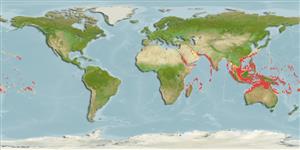Environment: milieu / climate zone / depth range / distribution range
экология
морской ассоциированный с рифами; немигрирующий; пределы глубины 0 - 150 m (Ref. 9710). Tropical; 34°N - 23°S, 31°E - 138°W (Ref. 5222)
Indo-Pacific: Red Sea to South Africa and eastward to French Polynesia. Reported from the Arafura Sea (Ref. 9819). Reports by Heemstra & Randall (1984, Ref. 3153) from the Gulf of Oman, Pakistan, India, and Sri Lanka are unsubstantiated. Absent from the Persian Gulf and is not yet known from Lakshadweep Islands.
Size / Вес / Возраст
Maturity: Lm ? range ? - ? cm
Max length : 50.0 cm TL самец/пол неопределен; (Ref. 11441); наибольший вес (опубликованные данные): 7.0 kg (Ref. 30874)
колючие лучи спинного плавника (общее число) : 9; членистые (мягкие) лучи спинного плавника (общее число) : 14 - 16; колючие лучи анального плавника: 3; членистые (мягкие) лучи анального плавника: 9. This species is distinguished by the following characters: greatest body depth 2.5-3.0 times in standard length (for specimens 13-39 cm SL); head length 2.3-2.5 times in SL; longitudinal scale series 95-108; ctenoid scales on body, including abdomen; caudal fin rounded; pelvic fins not reaching or just about the anus, 1.9-2.3 in HL. Colour of body orange-red, with small blue spots sparsely scattered but more densely on head and median fins; head also with elongated blue spots and lines; body with 4 dark bars (sometimes very faint) merging dorsally with blackish blotches at base of dorsal fin and extending onto the fin; 2 similar but smaller dark bar/blotches on caudal peduncle (Ref. 39231, 90102).
Adults are found in rich coastal to outer reefs, usually along deep walls with caves, rich with invertebrate growth such as large sponges or soft corals (Ref. 48635). They occur singly or in small groups (Ref. 90102). A secretive species which are active nocturnally in shallow water and diurnally in deeper water (Ref. 5222). They are often seen with the cleaner shrimp Periclimenes elegans (Ref. 37816). Adults feed mainly on fishes (Ref. 5222) and reach sexual maturity at 25 cm SL (Ref. 89707). Probably of commercial interest to certain local fisheries. Are caught with hook-and-line, traps, and spear (Ref. 39231). Minimum depth reported taken from Ref. 128797.
Life cycle and mating behavior
половая зрелость | размножение | нерест | икра | Fecundity | личинки
Heemstra, P.C. and J.E. Randall, 1993. FAO Species Catalogue. Vol. 16. Groupers of the world (family Serranidae, subfamily Epinephelinae). An annotated and illustrated catalogue of the grouper, rockcod, hind, coral grouper and lyretail species known to date. Rome: FAO. FAO Fish. Synop. 125(16):382 p. (Ref. 5222)
Статус Красного Списка МСОП (Ref. 130435: Version 2024-1)
Угроза для людей
Harmless
Использование человеком
рыболовство: рыболовство как средство для существования; объект спортивного рыболовства: да
дополнительная информация
инструменты
Специальные отчеты
Скачать в формате XML
ресурсы в Интернет
Estimates based on models
Preferred temperature (Ref.
123201): 23.7 - 28.5, mean 27.2 °C (based on 881 cells).
Phylogenetic diversity index (Ref.
82804): PD
50 = 0.5000 [Uniqueness, from 0.5 = low to 2.0 = high].
Bayesian length-weight: a=0.01259 (0.00587 - 0.02699), b=3.04 (2.87 - 3.21), in cm total length, based on LWR estimates for this Genus-body shape (Ref.
93245).
Trophic level (Ref.
69278): 4.0 ±0.66 se; based on food items.
устойчивость к внешним воздействиям (Ref.
120179): средний (среднего размера), минимальное время удвоения популяции 1.4-4.4 года (Preliminary K or Fecundity.).
Fishing Vulnerability (Ref.
59153): Moderate vulnerability (40 of 100).
Nutrients (Ref.
124155): Calcium = 42.7 [25.3, 74.7] mg/100g; Iron = 0.56 [0.32, 1.08] mg/100g; Protein = 18.5 [16.7, 20.1] %; Omega3 = 0.175 [0.110, 0.278] g/100g; Selenium = 48 [26, 84] μg/100g; VitaminA = 116 [44, 354] μg/100g; Zinc = 0.721 [0.509, 1.162] mg/100g (wet weight);
